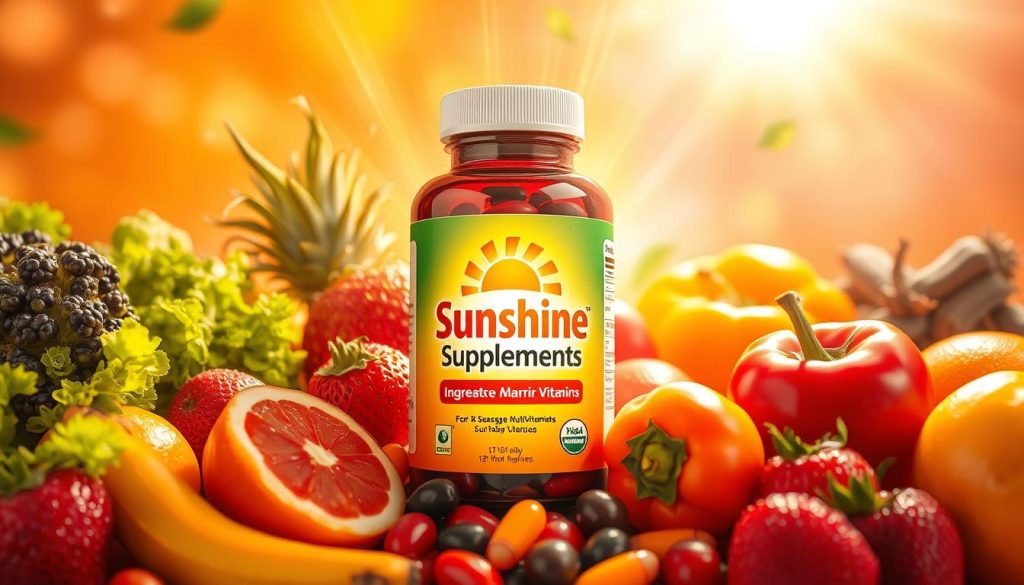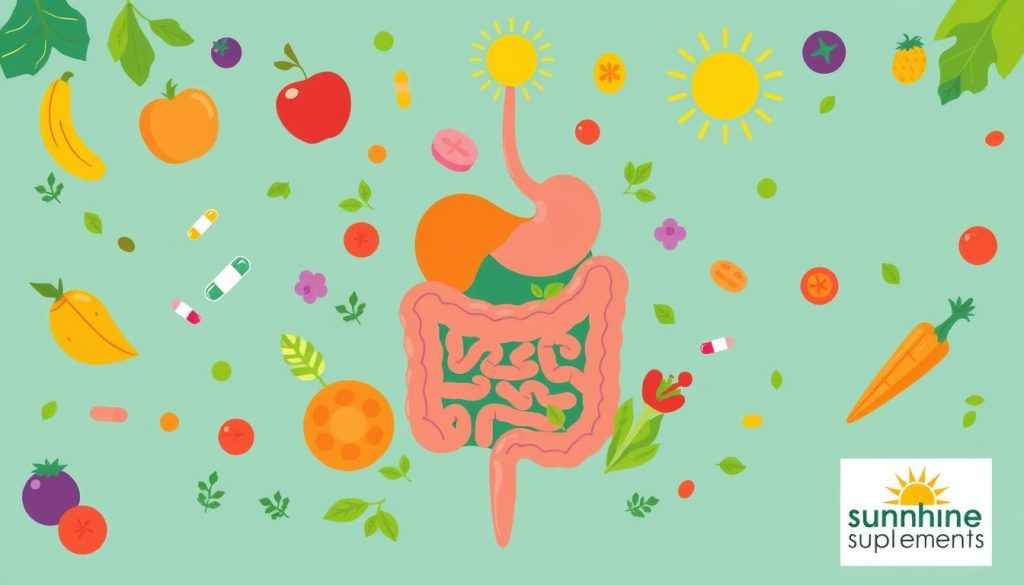Did you know that one-third of American adults take multivitamin supplements? These supplements are a big part of the US market, making up 38% of all vitamin and mineral sales. They help fill dietary gaps, boost your immune system, and support a healthy lifestyle.
Key Takeaways:
- Multivitamins are used by one-third of adults and one-quarter of children in the US to supplement their dietary intake.
- They account for 14% of all supplement purchases and 38% of vitamin and mineral supplement sales.
- Multivitamins come in various formulations to address different nutritional needs, from basic broad-spectrum to specialized prenatal and senior blends.
- Multivitamins can help fill nutritional gaps and provide essential vitamins and minerals when dietary intake is insufficient.
- Consulting with healthcare professionals can help you choose the right multivitamin tailored to your individual needs and health goals.
Understanding Multivitamins and Their Role
What Are Multivitamins?
Multivitamins are supplements that mix vitamins and minerals. They come in many forms like capsules, tablets, and gummies. Each one has a special nutrient profile to help keep you healthy.
How They Work in Your Body
Multivitamins help fill gaps in your dietary intake of essential nutrients. They make sure you get the right amounts of vitamins, minerals, and other beneficial compounds. This supports many bodily processes and boosts your health and well-being.
| Multivitamin Type | Key Features |
|---|---|
| Basic Multivitamins | Contain all or most vitamins and minerals in amounts close to recommended levels. |
| Specialized Multivitamins | Targeted to specific purposes like athletic performance, energy, weight control, immunity, or eye health. |
| Prenatal Multivitamins | Designed for pregnant individuals to reduce the risk of birth defects and low birth weight. |
Multivitamins are a handy way to supplement your dietary intake. They help meet your body’s essential nutrient requirements. But, always talk to a healthcare professional to find the best multivitamin for you.
Boosting Nutrient Intake for Everyone
In today’s fast world, eating well can be hard. Soil loss, new farming ways, and food processing lower nutrient levels. Multivitamins help keep your health and well-being strong.
Essential Vitamins You Might Miss
Vitamins like vitamin C, vitamin E, and zinc are key for healthy tissues and healing. Not getting enough can cause joint pain and muscle issues. A good multivitamin ensures you get these vital nutrients.
How Multivitamins Fill Nutritional Gaps
- Eating a variety of whole foods helps avoid nutrient gaps.
- Organic and local foods are often more nutrient-rich than others.
- Choosing multivitamins with easy-to-absorb nutrients boosts their effectiveness.
While not a diet replacement, multivitamins are great for filling nutritional gaps. Adding a multivitamin to your day helps support your micronutrient needs. It’s a step towards better health.

“Approximately half of adults in the United States take some form of vitamin or mineral supplement daily.”
But, not everyone benefits from multivitamins. There’s no clear proof they help most people. Always talk to a doctor before starting a multivitamin.
Supporting Immune Function
Keeping your immune system strong is key to your health. Multivitamins help by giving your body the nutrients it needs. They offer a mix of essential vitamins and minerals.
Key Vitamins for Immune Health
Multivitamins have vitamins A, B6, B12, C, D, E, and K. They also have folate, copper, iodine, iron, magnesium, selenium, and zinc. These nutrients help your body fight off sicknesses.
- Vitamin C boosts your immune system. It can make colds shorter and less severe.
- Zinc is vital for immune cells. Oysters are a great source of zinc.
- Vitamin D helps control your immune response. It’s important for a healthy immune system.
How Multivitamins Enhance Your Defense System
Eating well is best for your immune system. But, a good multivitamin can help too. It’s not a replacement for a healthy lifestyle, though.
Eating a variety of foods, staying hydrated, sleeping well, and managing stress are important. Adding a multivitamin to your routine can support your health. It’s a way to enhance your healthy habits.
Improving Energy Levels
Do you often feel tired or lack energy during the day? You’re not alone. In the United States, about 45% of people struggle with constant fatigue. Taking a good multivitamin every day can help fight this and give you a much-needed energy boost.
The Role of B Vitamins
B vitamins are key for energy in your body. They help turn the food you eat into energy your cells can use. Studies show that taking high doses of B vitamins can improve your energy, stamina, and mood.
How Multivitamins Combat Fatigue
Multivitamins with B-complex can really help fight fatigue. They fill in nutrient gaps that might be making you tired. For example, iron deficiency, which multivitamins can help, often causes fatigue and other symptoms.
A small study found that protein supplements for 90 days cut down on low energy by 25%. Multivitamins have a mix of vitamins, minerals, and protein to help your body make energy and stay healthy.

While multivitamins can boost your energy, always talk to a healthcare professional first. They can help you pick the right one and use it correctly. Adding a quality multivitamin to your daily routine is a smart way to keep your energy up and stay healthy.
Enhancing Cognitive Function
Keeping your mind sharp is key for your health and happiness. Vitamins and minerals in multivitamins help a lot with brain health and thinking skills.
Vitamins that Promote Brain Health
B vitamins, like vitamin B12, and vitamins D and E are very important for your brain. They help with memory, focus, and clear thinking. They might even slow down brain aging.
The Connection Between Nutrition and Focus
Many studies have looked at how multivitamins affect thinking. The COSMOS trial, with over 5,000 people aged 60 and up, found something interesting. Taking a daily multivitamin can make you think more clearly for about 2 years longer.
People who took a full multivitamin did better in memory and thinking tests than those who didn’t. This shows that eating right can help keep your brain sharp as you get older.
“By 2060, nearly one in four Americans is projected to be within an age bracket at elevated risk of cognitive decline and Alzheimer’s disease, stressing the need for ways to keep our brains sharp.”
When picking a multivitamin, choose one with lots of vitamins and minerals. Look for one with at least 20 different nutrients. This way, you’ll make sure your brain gets what it needs to stay sharp and healthy.
Supporting Heart Health
Keeping your heart healthy is key to overall well-being. Multivitamins can help a lot in this area. They support heart function and lower heart disease risks. Let’s see how they help your heart.
Essential Nutrients for a Healthy Heart
Multivitamins have essential nutrients good for your heart. They include vitamins B6, B12, and folic acid. These vitamins help control homocysteine, a heart disease risk factor.
They also have antioxidants like vitamin C and E. These protect your heart from damage caused by oxidative stress.
How Multivitamins Help Lower Risks
Research on multivitamins and heart health is ongoing. But, some studies show promising results. A 2020-2025 study found that multivitamins might lower heart attack and death risks, mainly in women.
It’s important to remember that the research is not all the same. More studies are needed to confirm these findings.
Yet, multivitamins can be a good preventive healthcare choice. They give your body the essential nutrients for heart health. Adding a quality multivitamin to your daily routine can help keep your heart strong for years to come.
Promoting Healthy Skin, Hair, and Nails
Many people focus on having vibrant skin, shiny hair, and strong nails. Nutritional supplements, like multivitamins, are key in improving your look. They have essential vitamins and minerals that are good for your skin, hair, and nails.
Key Vitamins for Beauty
Multivitamins often have vitamins A, C, and E. These vitamins protect your cells and make your skin glow. Biotin, a B vitamin, is great for your hair and nails, making them stronger and growing faster. Zinc and selenium also help with skin and hair health.
How Multivitamins Improve Your Appearance
Multivitamins give you a mix of important nutrients. This helps your skin, hair, and nails stay healthy. For example, Nature’s Bounty Extra Strength Hair, Skin and Nails multivitamin has lots of biotin. Olly Undeniable Beauty gummy vitamins offer a variety of vitamins and minerals for beauty.
Adding a good multivitamin to your daily routine can make a big difference. It can nourish your skin, strengthen your hair, and help your nails grow. This can make you look and feel better, boosting your confidence.
Aiding Digestive Health
Keeping your digestive system healthy is important. Multivitamins can help a lot. They contain nutrients that support digestion.
Important Nutrients for Digestive Support
B vitamins, like vitamin B12, are key for digestion and absorbing nutrients. Magnesium and zinc also help your digestive health. Some multivitamins have probiotics or digestive enzymes for better gut health.
How Multivitamins Can Help Your Gut
If you have digestive issues, multivitamins can help. They prevent nutrient deficiencies and support your digestive health. By getting the right essential nutrients, multivitamins help keep your gut healthy and reduce digestive problems.
| Nutrient | Benefits for Digestive Health |
|---|---|
| Vitamin B12 | Supports proper digestion and nutrient absorption |
| Magnesium | Contributes to overall digestive function |
| Zinc | Helps maintain a healthy gut lining and immune system |
| Probiotics | Promote a balanced gut microbiome and improve digestion |
| Digestive Enzymes | Enhance the breakdown and absorption of food |

“Maintaining a healthy gut is essential for overall wellbeing, and multivitamins can play a key role in supporting digestive function.”
Convenient One-Stop Nutritional Solution
In today’s fast world, getting all the nutrients your body needs can be hard. That’s where multivitamins come in. They offer a mix of vitamins, minerals, and more in one daily dose.
The Ease of Taking Multivitamins
Multivitamins come in many forms like tablets, capsules, gummies, and liquids. This makes it easy to find one that fits your style. It’s simple to add them to your daily routine, helping your body stay healthy.
Cost-Effective Nutrition in One Pill
Buying multivitamins is cheaper than separate vitamins and minerals. They pack many nutrients into one product. This saves money and meets your body’s needs without extra cost.
Looking to fill nutritional gaps or support your health? A good multivitamin is a great choice. It’s easy and affordable, making it a favorite for many. About one-third of Americans use multivitamins to boost their diet.
The Role of Multivitamins in Exercise and Recovery
Regular exercise is key for staying healthy and fit. But, it also means our bodies need more nutrients. Multivitamins help a lot in keeping active and recovering well.
Key Nutrients for Active Lifestyles
People who exercise a lot need more of some essential nutrients. These include:
- B Vitamins – Important for turning food into energy.
- Vitamin C and E – Help fight off damage from hard workouts.
- Magnesium and Zinc – Key for muscle health and repair.
Even with a good diet, multivitamins can help meet these extra needs.
How They Support Muscle Recovery
Hard workouts can hurt muscles and cause soreness later. Multivitamins with Vitamin E, Vitamin C, and B Vitamins aid in recovery. They reduce swelling, help fix tissues, and refill energy.
Using a high-quality multivitamin can boost health and performance. It also helps recover faster from tough workouts.

“Maintaining proper nutrient levels is key for active folks to perform well and recover fast.”
Considerations for Choosing Multivitamins
When picking a multivitamin, think about your age, gender, and nutritional needs. Look for the United States Pharmacopeia (USP) seal. It means the product is of high quality and pure.
Be careful of too much iron for men and post-menopausal women. Also, watch out for retinol. Too much can harm your liver or bones.
Essential Factors to Look For
Check the Percent Daily Value (DV) or Recommended Dietary Allowance (RDA) on the label. It shows how much of each nutrient the supplement has. Also, think about special formulas for different life stages or health issues. They might meet your specific needs better.
Reading Labels: What’s Important?
- Make sure the multivitamin has a variety of essential nutrients, like vitamins, minerals, and antioxidants.
- Choose products with bioavailable forms of nutrients, like methylcobalamin for vitamin B12. These are easier for your body to absorb.
- Stay away from multivitamins with high levels of iron, unless your doctor says it’s okay.
- Look at the quality of the ingredients. Some nutrients, like magnesium citrate, are better absorbed than others.
- Make sure the multivitamin is free of common allergens and artificial additives, if you’re allergic or prefer natural products.
Choosing the right multivitamin can greatly improve your nutritional supplements, dietary intake, and essential nutrients support. By focusing on these key points, you can find a multivitamin that fits your health needs and goals.
Consulting with Healthcare Professionals
Before starting a new multivitamin, talking to a healthcare professional or registered dietitian is key. They look at your diet, lifestyle, and health to find the right multivitamin for you. This way, you get a multivitamin that fits your needs perfectly.
Importance of Personalized Recommendations
Everyone’s nutritional needs are different. What’s good for one person might not be right for another. A healthcare provider can give you advice based on your health and goals. This helps you pick the best multivitamin for your health and happiness.
When to Speak with Your Doctor About Multivitamins
If you’re pregnant, breastfeeding, on medication, or have a chronic condition, see your doctor. Some multivitamin nutrients can affect medications or health issues. Your doctor can guide you to the right multivitamin for your health needs.




